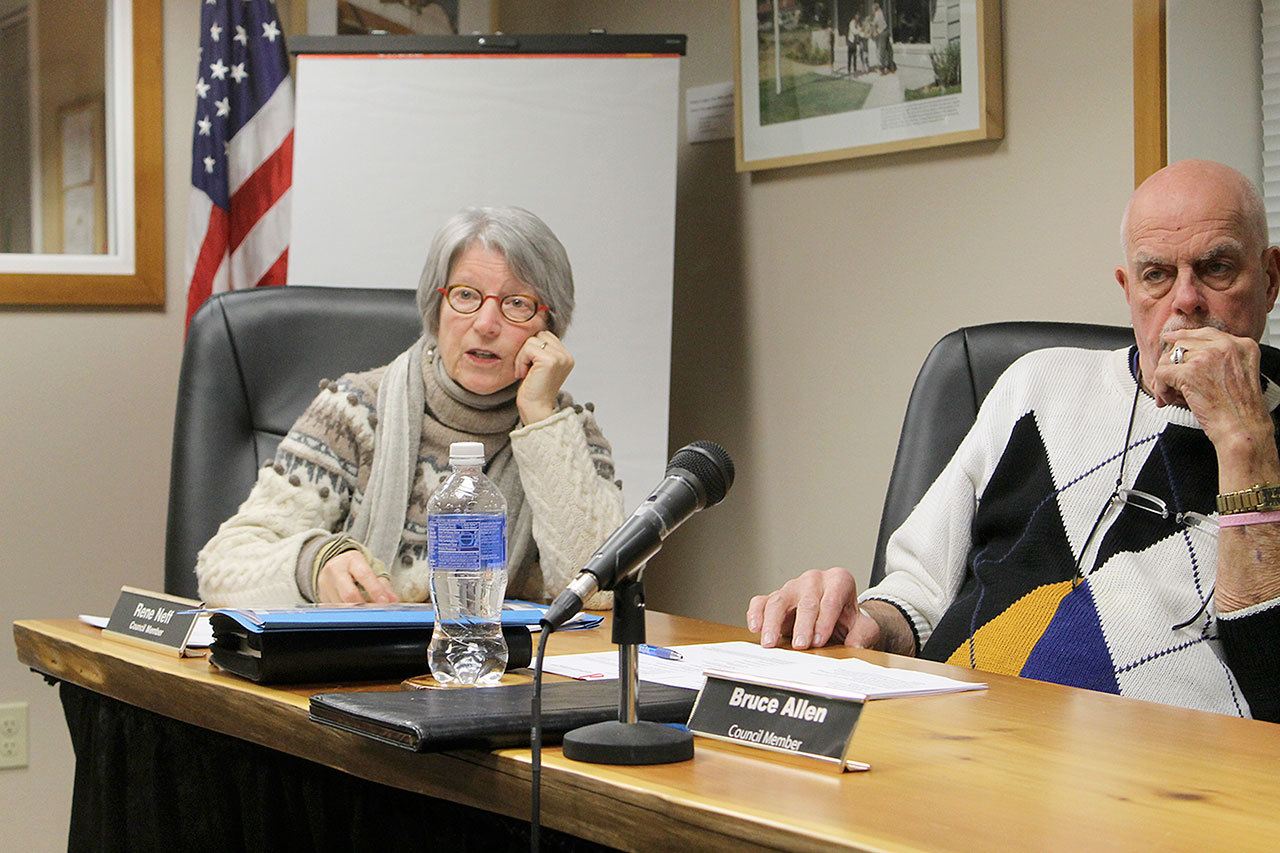Frequent users of Seawall Park can rest assured they won’t lose nighttime access to the park for at least the next nine months.
Rene Neff, Dominique Emerson and Bruce Allen of the Langley City Council voted to follow the recommendation of the Parks and Open Space Commission to table the park’s potential closure for six months, while also tacking on an additional three months so that more research can be conducted into the severity of illicit behavior that has occurred at the park.
The extension, proposed by Emerson, will allow additional data collection during the summer when illicit activity has been more active in the past, she said.
Councilman Thomas Gill was the lone opposing vote against the decision; Councilwoman Ursula Shoudy was not present at the meeting because of a dental emergency. Gill did not explain his “no” vote during the meeting and could not be reached for comment by press time Friday afternoon.
The city council directed the Langley Police Department to continue documenting incidents of when and where drug paraphernalia are found at all of the city’s parks. At the end of the nine months, sometime in September, the council will revisit the topic for review. A discussion could occur in October if the city council so chooses, Mayor Tim Callison said.
Tuesday night’s decision was another chapter in what has been a long conversation by the city council and the community since September. It all began when Police Chief David Marks proposed the city council close Seawall Park at nighttime after finding 40 syringes in the span of two weeks in August. The city council heeded his advice, and the testimonies of others who felt drug paraphernalia found at the park was a health risk, when it voted 4-1 in October to close the park from 12-6 a.m.
At their following monthly meeting, however, city council members tabled the plans to close the park at nighttime after a number of Langley residents and interested parties packed into City Hall to oppose the decision.
In a later interview with The Record, Marks agreed with Emerson that activity could ramp up again during the summertime. Marks said there are also benefits to gathering more information to make an informed decision.
But Marks remains a steadfast advocate for the park’s closure. Marks believes the problem has only subsided because a spotlight has been put on the parks through the press and by the community. Marks also claimed the police department has found “a lot” syringes in the past but it was not recorded.
Only two syringes have “officially” been found by the police department since August.
“I’m convinced it’s going to come back,” Marks said. “I don’t think we’re done with it.”
Marks also made an informal request at the meeting that the decision regarding Seawall Park be taken to the public for a vote, though he was aware that such a vote was likely not possible to be put on a ballot. Marks said that while outspoken critics of the potential closure have made their voices loud and clear at city council meetings, there is strong support for its closure amongst property owners and residents.
The city council did not acknowledge his request and continued with its motion to wait nine months.
In a later interview, Callison said Langley has a representative government and that a public vote would move it toward a “direct democracy.”
“That’s not how we operate,” Callison said. “…It would really diminish the role of the city council to express the will of the people.”
Neff, who is in her 12th year on the city council, felt the decision to wait over half a year was an opportunity for compromise. Neff said the collective voices of those who do not wish the park to have hours are currently louder than those who do.
“That’s the problem when people don’t come in and state their opinions,” Neff said. “It makes the council’s job difficult. I feel like at this point, we’ve heard a tiny bit from a couple property owners and a tiny bit from some people in town who would like to see the park have hours. They are very few compared to the people who have come and said they don’t want hours.”
Progress was also made in thwarting illicit behavior at Seawall Park. The city council instructed city staff to look into erecting a fence on a “temporary basis” along the bluff, stopping access to the underside of First Street businesses. The fence would keep people from trespassing, but may also help calm fears that trespassers might accidentally start a fire which could spread to other First Street buildings.
That effort will require both a meeting with private property owners and a conversation with the city’s attorney, Callison said.
Increasing vegetation along the bluff and increasing patrol activity by police are also moving forward as solutions to the problem.
The proposed fence would likely be built along the toe of the bluff.
“That would be another obstacle people who have to overcome to get into the bluff area,” Callison said.



